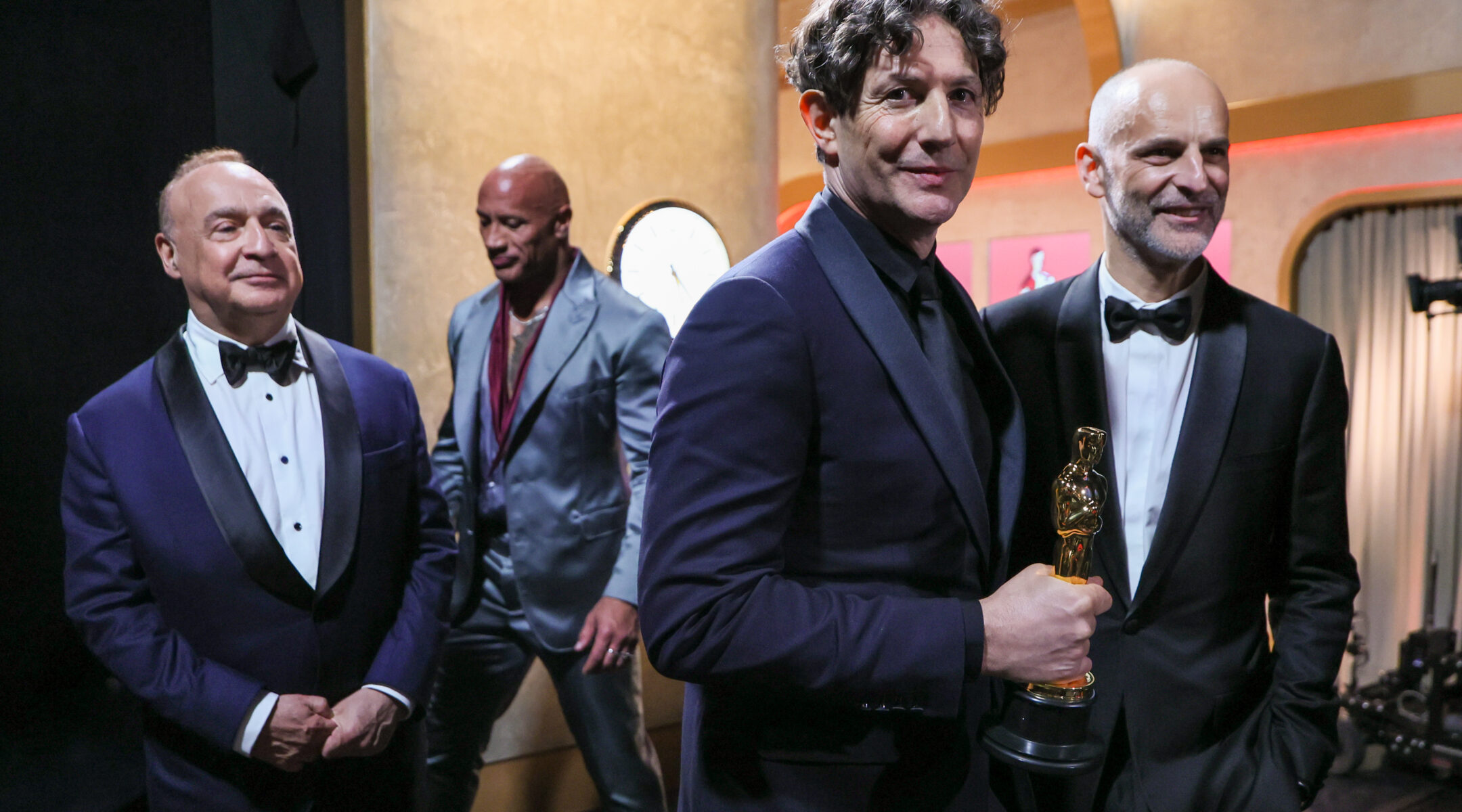(JTA) – As widely predicted, “Oppenheimer,” the biopic of Jewish nuclear physicist J. Robert Oppenheimer, swept a number of categories at Sunday’s Oscars, including best picture, in a year unusually heavy with Jewish nominees.
But the most talked-about Jewish moment of the night came courtesy of Jonathan Glazer, writer-director of the cerebral Holocaust drama “The Zone of Interest,” who used his acceptance speech to comment on the Israel-Hamas war.
Standing alongside producers James Wilson and Len Blavatnik during his acceptance speech for best international feature, Glazer denounced Israel’s occupation of Palestinian territory, which he said had led to “dehumanization” that had affected both Israelis and Palestinians.
“Our film shows where dehumanization leads at its worst. It’s shaped all of our past and present,” Glazer said.
“Right now we stand here as men who refute their Jewishness and the Holocaust being hijacked by an occupation which has led to conflict for so many innocent people, whether the victims of October the 7th in Israel or the ongoing attack on Gaza,” he added. “All the victims of this dehumanization. How do we resist?”
In a previous award acceptance speech last month, Wilson criticized “innocent people being killed in Gaza” as something people should face head on, rather than from behind “the walls we construct in our lives which we choose not to look behind,” in an allusion to the film’s depiction of Nazis and their families as willfully ignorant of the murder of Jews just beyond their gardens. Blavatnik, meanwhile, is one of several major donors to suspend their support for Harvard University over its response to Oct. 7.
Glazer’s comments elicited a range of reaction, including kudos from critics of Israel who mistakenly thought he had called Israel’s actions in Gaza “a holocaust” and castigation from prominent Jewish voices who misinterpreted his comments as saying that he was rejecting his own Jewish identity, rather than rejecting the use of the Holocaust to justify the “occupation.”
A founder of IfNotNow, a Jewish progressive group that has accused Israel of “genocide” and called for a ceasefire, said Glazer’s speech offered evidence of growing dissent against Israel among Jews. “More and more Jews are making clear that their Jewish values lead them to speak out against Israel,” Yonah Liberman tweeted.
Glazer, who was the first person to mention the conflict on stage, concluded by dedicating his Oscar to a real-life Polish resistance fighter whose story was featured in the film. He did not specifically call for a ceasefire in the Israel-Hamas war.
But a range of celebrities at the awards show — including musician Billie Eilish; director Ava DuVernay; and actors Mark Ruffalo, Mahershala Ali and Ramy Youssef — wore red pins supporting a ceasefire, in a show of support for Palestinians.
“It’s really inspiring that so many artists here have been down for the cause and are wearing these pins,” said Youssef, who is Arab-American and a leader of the Artists for Ceasefire movement, on the red carpet before the show. (Youssef traveled to Israel to film his recent autobiographical show.)
Meanwhile, a commercial funded by Robert Kraft to raise awareness of antisemitism also aired during the ceremony.
The winningest film of the night was “Oppenheimer,” based on the life of the “father of the atomic bomb,” that took home eight awards in total, including for Christopher Nolan for best director. Also scoring wins for the film were lead actor Cillian Murphy and supporting actor Robert Downey Jr., the latter for playing Oppenheimer’s real-life Jewish political rival, Lewis Strauss. The film features a great deal of discussion about its subject’s Judaism, including his efforts to recruit Jewish scientists exiled from Nazi-occupied Europe.
“Oppenheimer” and “The Zone of Interest” were two of an unusually large crop of Jewish nominees this year. Also competing in the best picture category were “Barbie,” the megahit musical comedy that incorporates the real-life doll’s Jewish inventor Ruth Handler (it won one Oscar, for best song), and “Maestro,” Bradley Cooper’s biopic of Jewish conductor-composer Leonard Bernstein (which stirred controversy with its makeup but went home empty-handed).
In addition to best international feature, “The Zone of Interest” also won the Oscar for best sound. The film’s unnerving approach to sound design spliced the noise of the unseen Auschwitz death camps onto the soundtrack while foregrounding the lives of the Nazi family whose patriarch was charged with overseeing it.
A handful of Jewish winners emerged from the evening as well. One was Arthur Harari, the co-writer of French best-picture nominee “Anatomy of a Fall,” who won for best original screenplay alongside his life and writing partner, Justine Triet. Harari has Mizrahi ancestry. Members of that film’s creative team wore Palestinian flag pins to the show.
JTA has documented Jewish history in real-time for over a century. Keep our journalism strong by joining us in supporting independent, award-winning reporting.






